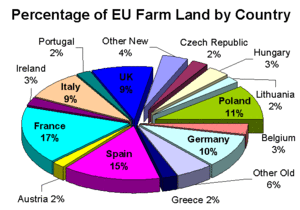EU policies. Common Agricultural Policy
When I think about European Union policies the first thing that comes to my mind is the Common Agricultural Policy. I would like to explain my reasons for my interest to this topic. First of all it represents almost the half of the total EU budget, around 48%, which accounts to approximately €50 billion. However it is projected that it will decrease to around 32% by 2014, following the new 2014-2020 financial perspective. Second of all it is one of the first common policies established by the European leaders and is still one of the most discussed and most controversial ones. The agriculture is a very important, and at the same moment delicate topic. Even if agriculture is not the dominant sector in any of the European countries the food security issue is extremely vital. As a citizen of this continent I am happy that our “local” products are being protected from the import of its substitutes from third countries. It is due to high cost of life in Europe and low cost of life outside. Farmers would not be able to survive if the prices would be leveled with the global trends. Unfortunately this is the only way, so far, to protect our own products. I really wouldn’t like to eat Chinese apples instead of my favorite polish “antonówka”☺
would like to explain my reasons for my interest to this topic. First of all it represents almost the half of the total EU budget, around 48%, which accounts to approximately €50 billion. However it is projected that it will decrease to around 32% by 2014, following the new 2014-2020 financial perspective. Second of all it is one of the first common policies established by the European leaders and is still one of the most discussed and most controversial ones. The agriculture is a very important, and at the same moment delicate topic. Even if agriculture is not the dominant sector in any of the European countries the food security issue is extremely vital. As a citizen of this continent I am happy that our “local” products are being protected from the import of its substitutes from third countries. It is due to high cost of life in Europe and low cost of life outside. Farmers would not be able to survive if the prices would be leveled with the global trends. Unfortunately this is the only way, so far, to protect our own products. I really wouldn’t like to eat Chinese apples instead of my favorite polish “antonówka”☺
The biggest problem is that the story doesn’t end here. After the II World War western countries started to promote, little by little, free trade around the whole world. Of course they would leave the Soviet block alone. The free trade was and still is working perfectly until you belong to the privileged group of “western” countries. Coming back to the CAP, it is working very well if we consider only the EU. The biggest discussion is around the subsidies issue. Until this debate is not over the WTO Doha Round won’t be finished. Third party countries are complaining that the EU is not letting the almost any agricultural products to enter its market. It is especially painful for less developed countries, which economies are based on agriculture, that don’t have the opportunity to sell to this market. It is mostly due to its customs policies, so that the non-european products would not be competitive.
 On the other side the EU is exporting a big share of its agricultural surplus, invading less developed markets with low prices and worse quality. Farmers also receive subsidies for export. It is a system that breaks totally the rules of the free market. Of course it is not that easy right now to make a u-turn and open the EU borders for foreign products, but obviously this system is not working, as it should be. In addition to that the system make the food MNC make higher profits. The prices are growing, portions are increasing, and production is getting out of control. All of this results in incredible amounts of food waste. In my opinion we, as the citizen of this planet, cannot afford neither permit to commit this kind of mistake anymore.
On the other side the EU is exporting a big share of its agricultural surplus, invading less developed markets with low prices and worse quality. Farmers also receive subsidies for export. It is a system that breaks totally the rules of the free market. Of course it is not that easy right now to make a u-turn and open the EU borders for foreign products, but obviously this system is not working, as it should be. In addition to that the system make the food MNC make higher profits. The prices are growing, portions are increasing, and production is getting out of control. All of this results in incredible amounts of food waste. In my opinion we, as the citizen of this planet, cannot afford neither permit to commit this kind of mistake anymore.




.png)
].gif)
.png)
].png)
].png)
].png)
.png)
].png)
.png)
